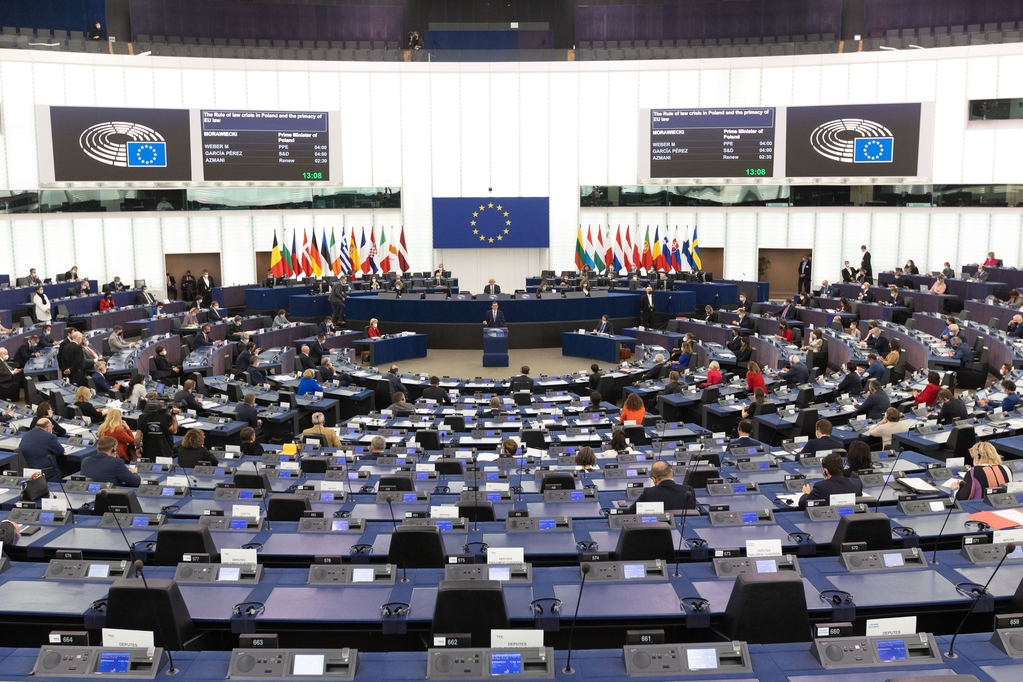The first meeting of the European Parliament’s committee of inquiry to investigate alleged breaches of EU law in the use of Pegasus and other surveillance software by among others Hungary and Poland took place on Tuesday.
As already reported, the 38-member committee was established on 10 March after an overwhelming majority voted in favour of it. The meeting took place against the backdrop of new disclosures of the use of spyware in other member states and the targeting of several MEPs, including Greens/EFA MEPs Diana Riba i Giner and Jordi Solé.
At a cross-party press conference yesterday, Belgian MEP Philippe Lamberts, president of Greens/EFA, said that more EU countries have been added to the list of the usual suspects that are subject to legal actions by the Commission over rule of law issues. He expected the Commission to take a tough position against the illegal use of spyware.
Both Poland and Hungary were represented in the panel. Polish MEP Andrzej Halicki (EPP) said that the spying in Poland started already in 2019 in connection with the European and national elections that year and threatened democracy. Hungarian MEP Anna Donath (Renew) said that a long list of political opponents had been targeted in Hungary and that it had become a European issue.
“European democracies aren’t immune,” she added.
Belgian MEP Saskia Bricmont (Greens/EFA), who has been nominated a rapporteur on behalf of her group, told The Brussels Times that the launch of the committee’s work went as planned and that a set of hearings and missions to member states were decided to deal with the different points in its mandate. Input from the political party groups will determine the detailed work programme.
To start with, the committee will arrange a workshop with IT- and cyber-crime experts. A hearing with the Commission in the plenary is planned in May. The Commission has not yet referred to any report in the wake of its own internal investigation last November of the targeting of Justice Commissioner Didier Reynders and other officials by spyware from the NSO Group.
A Commission spokesperson commented on Tuesday that it was up to the member states – using their independent checks and balance systems - to investigate the use of spyware by their governments and authorities. The Commission promises to cooperate with the Parliament in its investigation and reply to any questions it might have.
Media reported on Monday on a new spyware scandal named Cataloniagate in Catalonia, Spain, where The Citizen Lab, in collaboration with Catalan civil society groups, has identified at least 65 individuals targeted or infected with spyware, the majority of the with Pegasus.
The hacking covers a spectrum of civil society in Catalonia, from academics and activists to non-governmental organisations. Catalonia’s government and elected officials were also extensively targeted, from the highest levels of the Catalan government to members of the European Parliament, legislators, and their staff and family members.
“We do not conclusively attribute the targeting to a specific government, but extensive circumstantial evidence points to the Spanish government,” the report said.
In Greece, the prosecutor office on Monday started a preliminary investigation of the alleged surveillance of a Greek journalist who has been writing about money laundering and corruption in the banking sector.
In his case, his phone was hacked by a spyware called Predator but Citizen Lab, which had checked his phone, could not confirm whether the spyware was used by the Greek government or a private company. A previous media report claimed that the journalist had also been under surveillance by the Greek state intelligence service a year before the phone hack by Predator.
The Greek government has denied any involvement. However, in a possibly related event, the government asked already in March 2021 the senate to pass a law that would invalidate a law which obliged the Independent Authority for the Protection of Telephone Communications to inform citizens if their phones were monitored.
M. Apelblat
The Brussels Times

